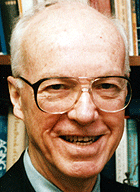Leonard Berg, M.D., the founder and former director of the Alzheimer’s Disease Research Center, died Monday, Jan. 15, 2007, following a stroke. He was 79.
Berg, professor emeritus of neurology, received many awards and honors for his contributions to Alzheimer’s research, including the Lifetime Achievement Award and the Public Service Award from the Alzheimer’s Association, the Peter H. Raven Lifetime Award from the St. Louis Academy of Science and the School of Medicine Second Century Award.

“Leonard Berg was one of the most talented and respected physicians I have known,” said Chancellor Emeritus William H. Danforth, M.D. “He was ahead of the rest of us in recognizing the importance of Alzheimer studies. We all trusted his judgment and wisdom.”
Berg had two separate and distinguished careers in medicine — one for several decades as a clinician in private practice and a second one in research. In the 1970s, motivated by his work with patients, Berg started a discussion group in the Department of Neurology on dementias. With his colleagues in the department, he was able to develop a system for distinguishing healthy aging from the onset of very mild dementia. Based on that research, the National Institutes of Health (NIH) in 1979 awarded Berg, who was in private practice, and colleagues at the school a four-year grant to study both groups over time, conducting regular, detailed assessments of their mental and physical status as the subjects grew older. The early work formed the foundation for the systematized assessment of dementia and detection of early onset of Alzheimer’s disease now in common use.
That study, known as the Memory and Aging Project (MAP), continues to this day, having studied a total of more than 3,000 volunteers during nearly 30 years. As neurologists, psychologists and pathologists have discovered that the processes underlying Alzheimer’s disease begin taking a toll on the brain decades prior to the disease’s first clinical symptoms, the MAP has provided researchers with valuable insights into subtle changes that may one day be used as markers of the disease’s onset. Such markers now are regarded by many as an essential step for successful treatment of Alzheimer’s disease.
In 1985, Berg was awarded a grant from the National Institute on Aging (NIA) to establish the Alzheimer’s Disease Research Center (ADRC) at the School of Medicine and Barnes Hospital. The center continues to be funded by the NIA and other agencies, supporting the work of several Alzheimer’s researchers recognized in recent years with the field’s highest awards. Berg stepped down as director of the center in 1997.
“Leonard Berg founded the Alzheimer’s disease research program at Washington University and led it to international prominence,” said John C. Morris, M.D., the Friedman Distinguished Professor of Neurology and current director of the ADRC. “He also was an esteemed neurologist and, for me and many others, a valued mentor and friend.”
Since 1997, the ADRC, with support from industry, has hosted a biennial Alzheimer’s research symposium in Berg’s honor.
“Leonard was a visionary clinician-scientist promoting Alzheimer’s disease research and clinical care at Washington University,” said David Holtzman, M.D., the Andrew B. and Gretchen P. Jones Professor and head of the neurology department. “The buzzword now at the NIH and around academia is translational research, but Leonard was doing cutting-edge translational research 30 years ago. I respected him as a physician-scientist as much as anyone I have known. As a person, he was a true mensch.”
Berg was a member of the American Medical Association, the American Academy of Neurology, the American Neurological Association, the Society for Neuroscience and the Society for Experimental Pathology.
Berg’s many leadership positions included terms as president of the American Board of Psychiatry and Neurology in 1985, chairman of the Missouri State Advisory Board on Alzheimer’s Disease and Related Disorders from 1988-1995 and chairman of the national Alzheimer’s Association’s Medical and Scientific Advisory Council from 1991-95. He was a member of the National Scientific Advisory Council of the American Federation for Aging Research for more than a decade and served on a Congressional Advisory Panel on Alzheimer’s Disease from 1993-95.
Born in St. Louis July 17, 1927, Berg graduated from the University in 1945 and from the medical school in 1949. After serving internships and residencies at Barnes Hospital, the Neurological Institute of New York at Columbia-Presbyterian Medical Center and the National Institutes of Health, Berg joined the medical school’s faculty as a community-based member of the voluntary faculty in 1955. He became professor of clinical neurology in 1972. Berg joined the school’s full-time faculty as a professor of neurology in 1989 and moved his clinical practice into the school’s neurology department. In addition to Barnes Hospital, now Barnes-Jewish Hospital, Berg provided care for patients and consulted on medical cases at St. Louis Children’s Hospital, St. Louis Shriner’s Hospital for Crippled Children and St. Louis Regional Hospital.
Berg is survived by his wife of nearly 59 years, Gerry Berg; two daughters, Kathy and Nancy; son John, his wife, Christine, and their daughter, Katie. John Berg is an associate vice chancellor and Christine Berg is a member of the faculty of the Program in Occupational Therapy.
A private family service and burial are arranged. Plans for a later public memorial service are pending.
Memorial donations may be made to the Alzheimer’s Disease Research Center. Call 286-2881 for more information or send to: ADRC-WUSTL, 4488 Forest Park Ave., Suite 130, St. Louis, Mo., 63108.